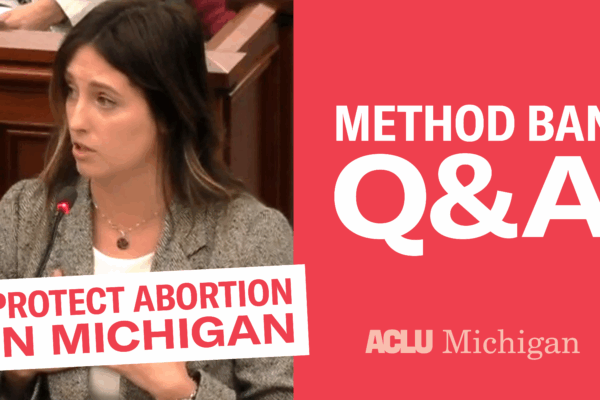Right to Life of Michigan says it has cleared a significant hurdle in its attempt to outlaw an abortion procedure known as “dilation and evacuation,” which is the medically preferred method for abortion care at or about 14 or 15 weeks.
A petition drive led by the anti-abortion group has reportedly submitted more than 374,000 signatures in a statewide petition drive to have the ban become law, about 34,000 more than is needed to qualify the measure for the November 2020 ballot.
What does this mean for Michigan residents who support a person’s access to a safe, affordable abortion? To find out, we sat down with ACLU of Michigan policy strategist Merissa Kovach to talk about this latest attack on abortion access, and the efforts under way to combat it, including what residents can do to stop it.
Question: Michigan Values Life, the signature gathering committee formed by Right to Life Michigan, had until December 23 to gather 340,047 valid signatures to place its initiative on the November 2020 ballot. It’s just been announced that the group says it has enough valid signatures to qualify for the ballot. Does that mean it is safe to assume the state’s residents get the opportunity to have their voices heard on this issue when they vote next November?
Answer: Not really. What’s much more likely to happen, if enough valid signatures are collected, is that the Michigan House and Senate will simply vote the petition language directly into law, which it has the option to do, circumventing voters and preventing a potential gubernatorial veto if both chambers pass bills reflecting the petition language.
Both chambers of the Legislature have already approved bills that contain the same language that’s in the initiative. Gov. Gretchen Whitmer has promised to veto that legislation if it reaches her desk. But, if the Legislature adopts the language of an initiative that has already qualified for the ballot, then it won’t be subject to veto by the governor and will automatically become the law. She won’t be able to stop it.
Q: It sounds like the anti-abortion folks might really be afraid to put the matter in front of voters.
A: I think that’s true. Their intent is to circumvent the will of the people. Recent polling shows that support for a person’s right to have an abortion is very strong in Michigan. Nearly 60 percent of the people polled consider themselves to be pro-choice. Given that level of support, they would have a very difficult time if this was actually left to the voters to decide. So, they sidestep the voters. This is what they must do to move their agenda forward.
Q: What will be the result if the anti-choice side is successful in the Legislature and their initiative becomes law.
A: It would criminalize a very safe method of abortion that is the standard of medical care for people who need an abortion at about 14-15 weeks of pregnancy. This procedure is used by physicians because of its proven safety record through years of research and medical practice.
Doctors would be forced to provide care in a manner dictated by politicians, even if they think it is inappropriate for their patient or risk criminal charges (2-year felony). In no other field of medicine would this be acceptable. It is for these reasons that leading medical groups, like the American College of Obstetricians and Gynecologists oppose this initiative.
Q: Do you see this being part of a larger pattern?
A: Absolutely. Since 2010, anti‐abortion politicians nationwide have quietly passed nearly 500 medically unnecessary and politically motivated restrictions, creating a web of barriers that push safe and affordable abortion care out of reach despite public support for a person’s right to make their own healthcare decisions, including the right to decide to end a pregnancy.
We cannot allow the passage of another restriction that stands in the way of a person and the care they need.
Q: What are the options for those who are oppose this becoming law?
A: For one thing, we can pressure legislators. They work for us. They are supposed to represent their constituents . In this case, they are not doing that. We only have to persuade a few members of the House or Senate to change their votes. If we can do that, we will be able to stop this from happening.
We will work to equip constituents with the information and tools they need to reach out to their legislators and demand that they do the right thing and vote against this.
Q: What about legal action?
A: If the Michigan Legislature does vote for the method ban and it becomes law, then the ACLU of Michigan is prepared to challenge it in court, because it is unconstitutional. Laws like this have been challenged a number of times in states across the country over the past, and so far we have largely been successful in having them struck down in the courts. In the past four years, however, while these successes have been encouraging, there is no guarantee we can continue to rely on the courts to protect a person’s right to choose. Especially concerning is what might happen if some of these cases make their way to the U.S. Supreme Court which, because of recent appointees by President Trump, has become more staunchly against abortion and other reproductive rights.
Q: What specifically can people in Michigan do to safeguard the right to choose?
A: They can join the fight by calling, writing, emailing and visiting their legislators to let them know how strong and widespread opposition to this ban is, and the electoral consequences they will face if they support it. As I said, a strong majority of people in Michigan clearly support the right to choose. What we must do is make sure their voices are heard so that that right to an abortion is protected. As a society, we cannot allow our state to be pushed backward.
To learn how to fight back, join our Organizing Call, where we’ll outline action steps you can take to protect abortion access. Register for the call now.



